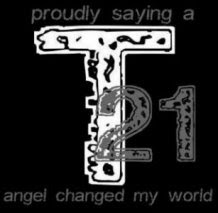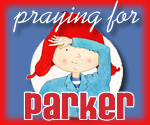I've been struggling with something for awhile now -- 4 1/2 years to be exact --pertaining to the use of labels or descriptors when referring to a person. Specifically, I'm trying to decide whether I'm waiting to be insulted by semantics or if there really is something behind the words. Admittedly, mostly these words I find insulting are not spoken maliciously (though sometimes they are) but maybe just with a lack of awareness that they might hurt.
Generally, it's hard to insult me. Heck, I have a talent for over analysis and can usually turn an insult around and somehow feel less bad about the spoken and the speaker. But sometimes words are NOT just words. Take the "N" word used to describe people of African descent. Take the "R" word that us mothers of children with special needs hate so much. Words are sometimes more than words depending upon the meaning society has assigned to them. Further, the word may have negative connotations specifically for the listener. Sadly, for the speaker, these meanings may not have been their intent. But, since "perception is reality" then my struggle is not unfounded. For me, some words or the way they're used -- even the position in the sentence -- CAN and DO hurt my feelings somehow.
It doesn't bother me when I hear someone say, "the blonde girl" or "that tall man". I think because having blonde hair or being tall is thought of as good... attractive... in our world. No one who is height-challenged likes to be called short and I didn't appreciate when an ex-boyfriend said to me, "wow, your hair is brown. JUST plain, old brown!" But, when I hear someone say, "that fat kid" or "an autistic boy", I cringe for the person and for their mother, father and siblings. Sure the kid may be overweight and, yes, the boy might have autism. But, that is not all they are. I guess what I'm saying is that I am sometimes insulted when the descriptor precedes the person... especially when the descriptor has negative connotations. I'm saddened that the description, coming first, has been given more importance than the individual. Maybe I feel this way because of the negative connotations our society has assigned to Down syndrome... and other descriptors like "fat". In my mind, the underlying negative connotations reduce the value of that person.
For me, the specific semantics in question were used to describe 2 of the people I love in this world more than life itself. My beautiful boys. Recently, talking about my amazing children who happened to have been born with an extra 21st chromosome, a good friend said, "... it's not because they're Downs kids..."
"OUCH"
I love my friend and I know she certainly didn't mean to insult me. Nor do the countless people who refer to my children this way. And, so many who refer to their OWN children this way. I hope. Still, I am bothered... deeply... by this phrase.
Do you see my children as "Downs" first?
And, does that make them "less" than a child without Down syndrome?
Of course, I know my kids have Down syndrome so the statement is not technically incorrect. I accept my children's Down syndrome. And, I accept that we may encounter limitations in some of their abilities... though so far, we have not!!! (Delays here and there, but not limits!) It's the term "Downs kid" that bugs me incessantly. It's NOT a cute little nickname for the syndrome my children have. And, it DOES put their potential disability before the wondrous people they are. Let me ask you this.... would you refer to that fat kid as "that FAT kid" to the mother of that child? Would you even say "that FAT kid" to any other mother on the playground lest they think you insensitive?
All over the internet, people like myself are working hard -- blogging about our children -- to dispel the negative connotations associated with Down syndrome. But, the truth is, more often than not, I think, people pity me because my sons have Down syndrome... as though I've been cheated out of the sons I should have/could have had. I have the most perfect children in the world and I would not change anything about them. They are perfectly imperfect just the way they are. BUT, the world still thinks of them as less than those of us who have only 46 chromosomes.
As such, PLEASE, consider changing the way you refer to my children -- or any kids who happened to have been born with an extra 21st chromosome -- to "children with Down syndrome" or, even better for me as "Brian & Michael". Consider that the direct or underlying meaning YOU have assigned to any particular descriptor is NOT the one that the listener may HEAR when you refer to her children as "Downs kids" or "that FAT kid". Unfortunately, in this case, my talent for over analysis actually brings me to the negative connotations AFTER my own positive thoughts about Down syndrome... which are, it's really no big deal! But, the societal meanings are still generally negative and ultimately, that phrase, "Downs kids", does bring up negative feelings for me because I think you might actually believe all those negative things you hear about "those kids".... The ones that have Down syndrome, like mine.
Sure, there are some descriptors that don't seem insulting... but you never know how the listener perceives the descriptor... true or not. Perhaps the blonde girl's mother fought the negative connotations of being a "dumb blonde" all her life and hopes her child will not face that same discrimination. Perhaps, the person you're discussing "that FAT kid" with just lost 100 lbs and spent their whole life ridiculed for being overweight. Perhaps the mother of "that Downs kid" believes you see her child as a retard (an insulting word, for sure). Her perception IS her reality!
So, if you absolutely have to use the descriptor because it enhances the conversation somehow... then try putting the person before the description and use a description that is factual and NOT slang:
a boy with autism (not an "autistic boy")
a child with Down syndrome (not a "Downs child")
the little girl with the red shirt (not a "fat kid")
In truth, unless you're specifically talking about Down syndrome... there is almost no reason for you to include that descriptor in any conversation about my children. Am I waiting to be insulted? No! With much more over analysis than I've even voiced here, I don't think so. I am just trying to educate the public to be more sensitive to the feelings of everyone around them. Words CAN hurt and the listeners perception IS reality.
Perhaps there is a GOOD and TRUE and HELPFUL way to phrase your comment. But, if it is not GOOD and TRUE and HELPFUL (all 3), perhaps it's better left unsaid.
Saturday, September 26, 2009
Subscribe to:
Post Comments (Atom)


















Bless you! I really struggled with learning people first language after we had Eon, and I'm a therapist. My tongue is just really lazy, but you really put this in perspective for me. I may link this to my blog, if that's ok.
ReplyDeleteAlso, about people feeling sorry for you because of Ds...I so wish there was a way that we could communicate how BLESSED we feel to have these kids! I think sometimes that outsiders think we're so positive because we're making the best out of it, or something. But, I just really, really LOVE this kid, including (and in some ways, because of) his extra chromosome! :)
I think you are dead on with the "leave it out unless it is absolutely necessary" to the conversation.
ReplyDeleteI was telling someone at a party last night about one of my favorite aspects of Ds and they kind of looked at me funny. I forget that people can't imagine that this life is good, even great in some ways.
Zing- on the button! Alot of folks do not understand at all how lucky we feel, and some believe we are making lemonade out of lemons (so not). It seems that every parent has certain buzz words that are more offensive than others but people first language is a project to work on for sure!
ReplyDeleteYou've written it well, very well. I was just discussing this with my sister and she really wants to make sure she refers to my son the correct way and I said that I can see why so many people say "He or she has Down's" because of Parkinson's and Alzheimer's. They just assume that's how it's said and that bothers me but not as much as "Down's baby" or Down's kid". Like you said it's putting the syndrome before the person and for some reason it makes the parent feel like the person saying it has negative feelings towards Down syndrome and thus looks down on the child. I think by blogging and sharing with our friends, hopefully the word will spread.
ReplyDeleteSuch a great post! I say 'ditto' to all of it :) You're so right about how come it's ok to refer to someone as that 'tall guy' or 'blonde girl' but the negative descriptors...just seem wrong.
ReplyDelete